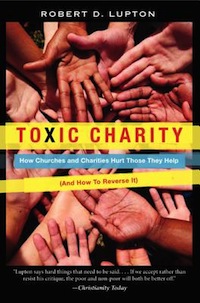 After all the billions of dollars that have been donated to charity over the years – why is poverty still a problem?
After all the billions of dollars that have been donated to charity over the years – why is poverty still a problem?
This question often gets asked of Haiti. After the 2010 earthquake some $9 billion was pledged by the international commmunity to help get the country back on its feet. Yet this week, Haitians again took to the streets to protest the fact that so much is still broken there.
What gives? Why has a solution been so elusive?
The problem, according to Robert Lupton is there is something fundamentally broken with the way we often do charitble work. Not only is the system broken, he says, but it often leaves the recipients of charity worse off than they were before.
Lupton holds a PhD in psychology from the University of Georgia and for the past 40 years has worked as a Christian Community Developer in inner-city Atlanta. Sensing a call from God, he and his wife left the suburbs, moved their family to the inner city, and started FCS Urban Ministries.
The Book
His book, Toxic Charity, was written to draw attention to what is broken in the compassion industry and help steer towards a solution.
At the core of the issue is that “when we do for those in need what they have the capacity to do for themselves, we disempower them” (6) and it ultimately becomes toxic.
For the first six chapters, Lupton explores the problem. In chapters three and four, he unpacks the disfunction that often exists in the relationship between those who help and those who receive it. He points out that “relationships that are based on need are seldom healthy…and they require more and more need to continue” (60-61) and “when we respond to a chronic need as though it were a crisis, we can predict toxic results: dependency, deception and disempowerment.” (56)
In chapters five and six he examines the issues that stem from institutional, top-down approaches to compassionate work, showing that large scale efforts are often derailed when grassroots issues are ignored.
In the last four chapters, he starts to flesh out a solution by showing that if we are diligent to employ a simple set of best practices, much of this damage can be avoided. As a basic starting point, he offers his own version of the Hypocratic Oath, The Oath for Compassionate Service (128) that lists in bullet point form, 6 practices all compassionate workers ought to embrace.
My Thoughts
This is a helpful little book.
The concrete examples he offers were particularly helpful. His 40 years of experience have given him an arsenal of stories to use to illustrate his points. What does it mean to disempower the poor? He brings you right into the living room of a poor family as they find themselves the recipients of irresponsible charity and explains the dynamics present there in such a way that you can almost feel the shame yourself.
At times I felt the book was unnecessarily negative. Particularly when he talks about the impact of Short-Term Missions (STMs). It’s popular in books like this to label STMs as “Religious Tourism” and dismiss the whole movement as a waste of time. Although he points out legitimate issues, I’m not sure he makes the case for them being as fruitless as they are depicted.
Overall, Lupton does a good job proving his point: When you do for the poor what they are capable of doing for themselves, your charity becomes disempowering and toxic. On the other hand, charity that seeks to empower and come along side the poor can be truly transformative.
Should you read this?
This is a great book for those who are involved in some sort of compassionate ministry – especially for those who have never really thought critically about their work. It’s also great for those who want to ensure their charitable giving is effective. If that is you, this would be a great book to get you started.
It’s a short, easy read (I read it over the course of two flights). Overall I found it to be very helpful.
[box type=”info” border=”full”]Robert Lupton. Toxic Charity: How Churches and Charities Hurt Those They Help (And How to Reverse It). New York, NY: HarperOne, 2012. 191 pp. $14.99[/box]
*This post contains affiliate links. More info about this here.



